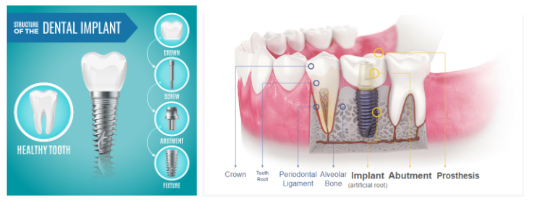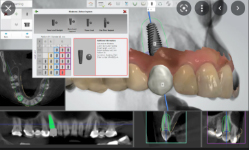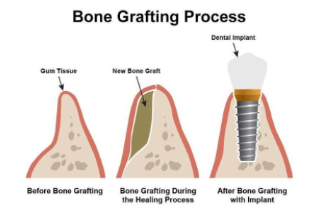
Implant Dentistry
A dental implant is a device placed in the jaw which acts as a fixed replacement for a natural tooth.
Historically, replacing missing teeth required a person having healthy teeth around the gap in order to have a dental prosthesis such as dentures or bridges.
Advances in dental technology have allowed the development of prosthesis permanently positioned in the jawbone; without the need to alter or rely on the surrounding healthy teeth. These are dental implants.
What are dental implants?

Dental implants (also called implant fixtures) are permanent titanium prosthesis placed beneath your gums, in the jawbone.
Unlike other dental procedures, this is a lengthy process, taking upwards of 3-6 months for bone to grow towards and around the implant, essentially fusing and securing it in place.
During this period of time, it is vital the area is tended to carefully and kept clean to allow proper healing to occur. A temporary tooth replacement may also be fabricated to fill the gap in the interim.
Once the implant is fully integrated, it replicates the function of a natural tooth root, acting as an anchor for a variety of prosthesis.
What can be placed on an implant?
- Dental crowns – an artificial cap to replace a single missing tooth
- Dental bridges – a series of connected crowns over multiple implants used to fill larger gaps
- Full arch bridges – a prosthesis which replaces all the missing teeth in the upper or lower jaw fixed to multiple implants
- Overdentures – removable dentures connected to implants for greater retention and stability
What is Digital Implant Planning?
There are various factors that affect whether a person is suitable for implants such as the amount of bone available in an area or the proximity and position of anatomical structures (sinus, nerves, blood vessels etc). Historically, one of the biggest barriers to implant placement was the inability for dentists to visualise all these factors before the actual procedure itself making the process much more unpredictable.
The advent of modern dental imaging techniques such as cone-beam computed tomography (CBCT) and digital scanning of the mouth (intra-oral scanning) allows the complete digital planning of an implant before the procedure is even started.

FAQs
How long does it take from getting an implant to having the space filled?
The entire process length ranges anywhere from 4-6 months for the majority of implant cases, to a year or more for complex cases.
In the meantime, a temporary replacement tooth can be arranged.
Will my health fund cover implants?
With private health insurance, dental implant treatment falls under the umbrella term of ‘Major or Complex Dental’. The payout would depend on your level of health fund coverage and it is best to speak to your insurer to determine what they can do for you.
Note however, that because the implant process is quite lengthy, with the surgical and restorative phases occurring months apart from each other, this cost is separated over 2 major parts which can be covered separately over a period of time.
I’m interested in having an implant done for a tooth which is still in my mouth.
Should I ask my dentist about it before I have it out, or after it heals up in the future?
We definitely recommend letting your dentist know if you’re thinking about implants before you have a tooth out.
When a tooth is removed, the bone around it shrinks and narrows, while certain structures such as blood vessels, nerves or the sinus begins to move into the space left behind. When left too long, dentists are left with limited space to place an implant, making the procedure much more complex and costly than it could’ve been.
To avoid this, your dentist may recommend that an implant be placed immediately after a tooth is removed. At other times, they may recommend grafting in a freshly extracted tooth socket called ‘socket preservation’ to prevent bone loss.
These procedures aim to reduce the need for additional major surgical procedures later on, saving you time and money in the future.
It’s been awhile since I’ve had a tooth out – is it still possible to have implants?
Yes in the majority of cases.
More advanced dental implant techniques such as bone grafting or sinus lifts help regain some of the lost bone and space, making the placement of implants possible. Note however that there is a limit to this, and your dentist will need to do a detailed examination to figure out what will work for you.

What can I expect after having an implant placed and do I need time off?
The implant experience differs from person to person depending on how complex your case is.
Some head back to work the next day with little to no issues while others may experience some swelling and discomfort for a while after, requiring time off for a few days.
We generally recommend:
- having the day of the implant surgery off to recover. This means no heavy lifting or exercising.
- to expect some form of swelling and discomfort within the first few days to a week.
Can an implant placement fail?
While unpleasant to think about – yes, implant placements can fail at times. This is called osseointegration failure – when the jawbone fails to grow towards the implant.
There are a variety of reasons why this may occur including:
- certain medical conditions causing delayed/poor healing
- Strong, heavy grinding causing movement of the implant
- poor oral hygiene and active gum disease in the mouth
- insufficient (or poor quality) jawbone to start with
- the effect of smoking on healing.
Before your implant procedure, your dentist will discuss your risk of failure depending on your circumstances and form a management plan with you if it does occur.
Do implants last forever?
Unfortunately not – implants may fail overtime if not cared for correctly. Being an artificial device, they will not develop decay as your other natural teeth. However, implants may fail through:
- Gum disease (and bone loss) – if oral hygiene is poor in the area causing plaque build-up and inflammation
- Fracture of the implant or the crown/bridge/denture above it – particularly in people who grind heavily or overuse their implants to chew hard foods (nuts, ice blocks) – which they shouldn’t be doing!
It is very important that implants be carefully maintained as per your other natural teeth – to ensure that any early issues are managed right away and so that they last the long haul.
